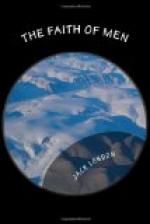Here and there, on the white spaces on the map, little circlets like the letter “o” are to be found, and, appended to these circlets, on one side or the other, are names such as “Fort Hamilton,” “Yanana Station,” “Twenty Mile,” thus leading one to imagine that the white spaces are plentifully besprinkled with towns and villages. But it is a vain imagining. Twenty Mile, which is very like the rest of the posts, is a log building the size of a corner grocery with rooms to let up-stairs. A long-legged cache on stilts may be found in the back yard; also a couple of outhouses. The back yard is unfenced, and extends to the sky-line and an unascertainable bit beyond. There are no other houses in sight, though the Toyaats sometimes pitch a winter camp a mile or two down the Yukon. And this is Twenty Mile, one tentacle of the many-tentacled P. C. Company. Here the agent, with an assistant, barters with the Indians for their furs, and does an erratic trade on a gold-dust basis with the wandering miners. Here, also, the agent and his assistant yearn all winter for the spring, and when the spring comes, camp blasphemously on the roof while the Yukon washes out the establishment. And here, also, in the fourth year of his sojourn in the land, came Neil Bonner to take charge.
He had displaced no agent; for the man that previously ran the post had made away with himself; “because of the rigours of the place,” said the assistant, who still remained; though the Toyaats, by their fires, had another version. The assistant was a shrunken-shouldered, hollow-chested man, with a cadaverous face and cavernous cheeks that his sparse black beard could not hide. He coughed much, as though consumption gripped his lungs, while his eyes had that mad, fevered light common to consumptives in the last stage. Pentley was his name—Amos Pentley—and Bonner did not like him, though he felt a pity for the forlorn and hopeless devil. They did not get along together, these two men who, of all men, should have been on good terms in the face of the cold and silence and darkness of the long winter.
In the end, Bonner concluded that Amos was partly demented, and left him alone, doing all the work himself except the cooking. Even then, Amos had nothing but bitter looks and an undisguised hatred for him. This was a great loss to Bonner; for the smiling face of one of his own kind, the cheery word, the sympathy of comradeship shared with misfortune—these things meant much; and the winter was yet young when he began to realize the added reasons, with such an assistant, that the previous agent had found to impel his own hand against his life.




